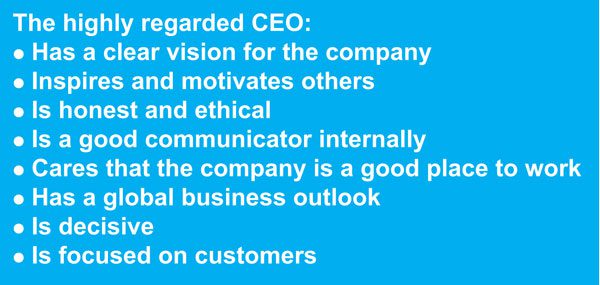Those are among the conclusions of a new CEO Reputation Survey by public relations firm Weber Shandwick, whose respondents included 1,700 senior executives across 19 countries.
What are the elements of a solid reputation that can elevate a CEO or company owner and, thus, his company? The executives surveyed offered up this list of 8 characteristics that help determine the difference between a “highly regarded CEO” and a “poorly regarded” one.
The executives surveyed attributed nearly half (45%) of their company’s reputation to the reputation of their CEO, and half of them predicted that CEO reputation will matter more to company reputation in the next few years.
In fact, “company leader reputation” placed fourth among the factors that “influence a great deal” a company’s overall reputation, with 49% of those executives surveyed citing it. The No. 1-cited factor was “quality of products and services” with 66%, followed by “financial performance” 57%, and the company’s industry’s reputation 50%. “Marketing and communications efforts” also were cited by 49%.
Less-important factors included “company reputation for innovation” 48%, “what news media says about company” 45%, “what employees think and say about the company” 42%, and “what is said about the company in social media” 32%.
Also, CEO reputation is very consequential for the bottom line Executives estimated that 44% of their company’s market value is attributed to the reputation of their CEOs. “This extraordinary interdependence between CEO reputation and market value demonstrates that leadership is a resource worth investigating in and cultivating,” Weber Shandwick said.
“Business leaders are at a pivotal point,” the report further concluded. “They are emerging from a period in which CEOs kept fairly low profiles, raised to the public spotlight only by crisis or scandal. While they were keeping quiet, the media landscape exploded around them, effectively crowding out carefully crafted message points and spawning increasingly distracted audiences only interested in 140 characters at a time.”
Fortunately, the report advised, “CEOs have entered a golden age of opportunity in which to tell their company stories. They are far less dependent on traditional media to profile their biographies and echo their future strategies. CEOs can now take their storytelling content directly to stakeholders without negotiating with the media,” through content marketing and social media.








